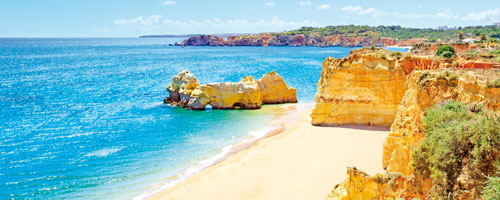
According to research by HSBC, the number of people approaching retirement wanting to live overseas is higher than before the economic downturn - up from 30 per cent in 2006 to 38 per cent last year.
Spain is the most popular destination, followed by France, Italy, Portugal and Greece. A warmer climate, healthier lifestyle and low cost of living are all elements contributing to the grey flight, not to mention the lure of affordable property. Even so, cash-laden baby boomers need to be aware buying an overseas property to live in permanently is very different from hunting for a holiday home to use for a few weeks a year. Here are some pointers for planning for the long term.
1. Location
Choose a place that has something going on year-round; seaside resorts are great in summer, but can be ghost towns in winter. Big coastal towns like Alicante and Valencia can be better choices than small villages.
Buying on the fringe of a town or city has lots of advantages, not least good transport links with the rest of the country and access to restaurants, shopping and entertainment. It's no surprise to find Tuscany so popular in Italy, with Florence, Arezzo, Pisa and Siena easily accessible.
A remote farmhouse may be impractical and lonely if you don't speak the language and find yourself on your own. Jelena Cvjetkovic, international network manager at Savills, says: "When considering a retirement property, location is key. The rural dream may sound appealing, but the reality of seasonal flights or relying on only one budget airline could be an issue when family want to visit or you need to rush home to see the newly-born grandchild.
"We find that the majority of our purchasers want to be on the outskirts of a village, close enough to get a carton of milk, but far enough for some peace and quiet."
Living within two hours of a major airport which has year-round flights is ideal, as it means you may get more visits from family and friends. If you are not sure where you want to live, take your time and rent before you buy.
By renting for six months, you can see what the place is like at different times of year. Europarcs (europarcs.com) has just launched long-stay holidays at two of its resorts - Vilanova near Barcelona and Marjal Costa Blanca near Alicante - where retirees can stay for up to six months and research the area where they would like to live.
2. Climate
Some countries can be blisteringly hot in summer, which may not suit everyone. Seeking a dry, moderate climate is best, as it enables you to keep active year-round, pursuing your favourite outdoor activities such as golf, cycling or hiking. A moderate climate also keeps the heating bills down. The Algarve is a retirement-friendly region of Portugal which has an ideal year-round climate.
A spokesman for the new Portugal property portal Meravista (meravista.com) reports that the cost of properties in the Algarve is far lower than in the UK, with good road networks and proximity to beaches, shops and restaurants.
"Most people retire to the Algarve for the climate (300-plus sunshine days a year) and the lifestyle. Speaking the language is a bonus, but it isn't vital, as English is spoken in most places."

3. Keep a UK base?
4. Language
5. Healthcare
6. Security and manageability

7. Accessibility
What about a bungalow? Some coastal resorts in Turkey are very steep, like Kalkan, which has a road so vertiginous they call it cardiac hill! Driving may be an issue in the future, too. You may not want to take long car journeys, particularly if you are alone. Do you want to be reliant on a car? "Air and rail links should be considered. Ideally, you should be within an hour of at least one airport, and within 10-15 minutes of a motorway junction. Being within striking distance of a railway station may be a useful benefit," suggests Chris Garwood of Select Villas of Moraira (select-villas.es).
or resort, where you will easily find somewhere to learn Spanish, join clubs, gyms, bowls, tennis, amateur dramatics, concerts, etc." An on-site concierge can be helpful, too, if you need a lift into town, to book a local taxi or to help you with shopping or packages.
8. Low living costs
9. Community
The less touristy the town is, the more likely there is to be a year round community. Talk to people in the village you want to live in, and hope for a good mix of nationalities, so you won't feel like the only foreigner. "A sense of community is important," says Jelena Cvjetkovic of Savills. "Visit the area at different times of the year to make sure that the restaurants and shops are open year-round." Communal facilities on a resort - pool, tennis, gardens, club-house and the bar - can be very sociable, too.

10. Pensions and benefits
Taking out residency in the country you move to may have benefits, too. The UK has reciprocal tax arrangements with most countries, so you should only pay once. Find out how to transfer your pension and claim other benefits, visit gov.uk/moving-or-retiring-abroad.
"Do your homework with regard to pensions, benefits and medical care under the state healthcare system. Make sure you will continue to be eligible and receive these allowances once you move abroad," advises Rhona Hutchinson of Integrated Relocation Spain (i-r-spain.com). And watch out for currency fluctuations, which can impact hugely on the amount you receive - consider using a foreign currency broker. Cara Fortune, of the Foreign and Commonwealth Office's Know Before You Go team, says: "Making a permanent move overseas is a dream come true for many Brits, and thousands have made a successful transition by researching thoroughly. "We recommend planning all areas of your move, from researching the local laws and customs to understanding your tax liabilities both in your new home and back in the UK. Our guide to moving abroad will steer you through many of the points you need to consider." Visit fco.buyassociation.co.uk.
(This article was first published in A Place in the Sun Magazine - Spring 2014 issue 117)